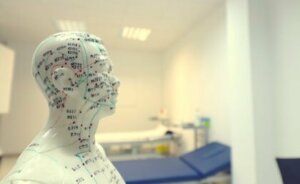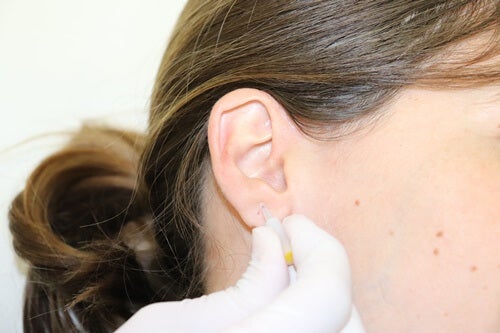Acupuncture Treatment for Neurodegenerative Diseases


Written and verified by the psychologist Valeria Sabater
Diseases such as Parkinson’s, multiple sclerosis, or restless legs syndrome affect thousands of people around the world. Usually, medical professionals can do nothing to stop their progression. However, acupuncture treatment for neurodegenerative diseases has succeeded in improving the quality of life and mobility of many patients.
We all know that most of these ailments, which originate in the nervous system, have no cure. However, neurobiological and genetic advances are undoubtedly very encouraging.
Experts in the field, such as Doctor José Manuel Fuentes Rodríguez, a researcher at Biomedical Research Networking Center on Neurodegenerative Diseases (CIBERNED), point out that we have a lot of data on how to improve therapeutic strategies.
In addition to this, advances in the area of neuronal plasticity using stem cells have also shown improvements at a motor and sensory level. Science doesn’t stop advancing, there’s no doubt about it. However, in the absence of treatments to reverse such serious conditions, medical professionals are focused on improving patients’ quality of life.
This is where treatments based on alternative therapies, such as acupuncture, offer some hope. For example, the Center for Neuro-Regenerative Medicine has experienced and specialized professionals who can help reduce the symptoms of these conditions and relieve discomfort, regardless of the patient’s age or the time they’ve suffered from the condition.

What acupuncture treatment for neurodegenerative diseases consists of
Acupuncture treatment for neurodegenerative diseases is a non-pharmacological therapy with no adverse side effects. Its applications in the field of neurology have shown remarkable benefits.
An innovative treatment
Implant acupuncture is a technique of German origin, discovered by the founder of the Center for Neuroscience and Regenerative Medicine (CNRM). It involves the use of a permanent needle to treat neurodegenerative diseases such as Parkinson’s, restless legs syndrome, multiple sclerosis, vascular dementia, or Pick’s disease, among others.
The goal of this therapeutic strategy is twofold. On one hand, to reduce the progression of these diseases as much as possible. On the other hand, to improve the patient’s quality of life.
How is it applied?
Acupuncture treatment for neurodegenerative diseases consists of the permanent application of tiny titanium micro-implants in the ear cartilage (auriculopuncture).
- These micro-implants are painless, unnoticeable, and aim to reduce symptoms and relieve discomfort.
- A multidisciplinary approach, including areas such as neuropsychology and physiotherapy, is used throughout the treatment.
Clinical trials and patient testimonials
The Center for Neuroscience and Regenerative Medicine (CNRM) conducted a comparative study to determine the effectiveness of acupuncture treatment for neurodegenerative diseases. In this case, they analyzed the benefits of this therapy in a group of patients with Parkinson’s disease.
- The sample was 32 men and women who suffered from this disease, with an average age of 54.
- It was a double-blind study. This means that neither the patients nor the professionals treating them were aware of which trial group each member belonged to.
- The researchers concluded that the patients who were treated with permanent acupuncture presented fewer modifications in their pharmacological treatment (dose increase, inclusion of new drugs, etc.). Likewise, they manifested fewer complications in the development of their disease.
- After one year of the trial, researchers concluded that the permanent needle provides greater stability to the pharmacological treatment against the disease.

What do patients say?
It’s clear to us that acupuncture treatment for neurodegenerative diseases doesn’t reverse nor cure these conditions. However, Parkinson’s patients who followed this treatment summarize their experience as follows:
- They feel more autonomous. They can perform everyday tasks that they were unable to do before the treatment.
- They’re able to use fine motor skills again to do activities such as sewing, cooking, and playing musical instruments, DIY, and gardening.
- Recovering autonomy means that patients can improve their quality of life. Most importantly, this has an impact on their mood, motivation, and their relationships with their immediate environment.
Conclusions
As you can see, this treatment should be taken into account. It has no side effects and, along with a multidisciplinary approach, leads to well-deserved well-being that can improve a patient’s quality of life.
Have a look at this interesting article that shares testimonies from real patients who underwent this treatment.
All cited sources were thoroughly reviewed by our team to ensure their quality, reliability, currency, and validity. The bibliography of this article was considered reliable and of academic or scientific accuracy.
- Tsung-Jung Ho (2014) The Possible Role of Stem Cells in Acupuncture Treatment for Neurodegenerative Diseases: A Literature Review of Basic Studies. Cell Transplant DOI: 10.3727/096368914X678463
This text is provided for informational purposes only and does not replace consultation with a professional. If in doubt, consult your specialist.








